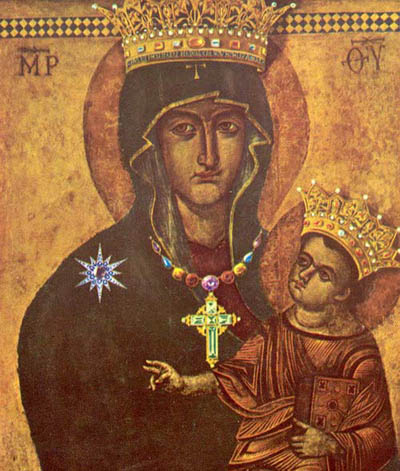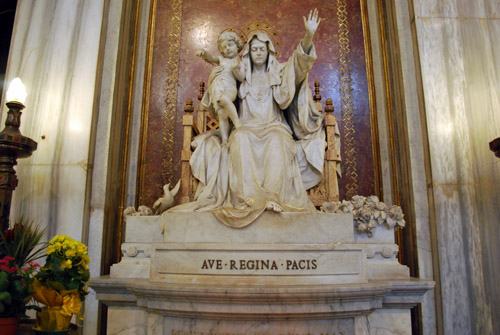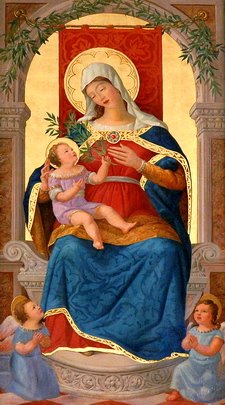

Salus Populi Romani, shown with crowns bestowed by Pope Pius XII.
There is a Mass of Our Lady Queen of Peace, also known as the Feast of the Prodigies of the Blessed Virgin Mary. We are told by scholars that the word Ave, Hail, means "peace (or joy) to thee," so that every time we salute Her in the words of St. Gabriel we proclaim Her the peaceful One, She who is full of grace—and are they not both the same? Peace! That is the constant prayer of the Church. Lamb of God, grant us peace! is the daily prayer in the Mass. Peace and true concord, peace and unity, is the earnest prayer in the Litany of the Saints. May they rest in peace! is the prayer repeated so many times a day for the poor souls. In the Mass of the Blessed Virgin for Easter time the Church sings—"The rod of Jesse hath blossomed: a virgin hath brought forth God and Man: God hath restored peace, reconciling in Himself the lowest and the highest."
The loveliest name of the Messias to come was "the Prince of Peace," as given in the Prophet Isaias (9: 6), "a Child is born to us, and His name shall be called… the Prince of Peace." It is an unforgettable picture which Isaias paints of the spiritual Kingdom of Christ—"The wolf shall dwell with the lamb; and the leopard shall lie down with the kid; the calf and lion, and the sheep shall abide together, and a little Child shall lead them" (Is. 11: 6). When Jesus was born the world was at peace. It was His will to have things that way, to show that He was the bringer of peace and reconciliation. The first song heard about His crib was the angelic message of peace, "Glory to God in the highest, and on earth peace to men of good will." He lived in peace at Nazareth for the many years of His hidden life. When at the beginning of His public life He declared the Constitution of the New Kingdom in the Beatitudes, He insisted on peace as an essential. "Blessed are the peacemakers; for they shall be called the children of God" (Matt. 5: 9). It was the essence of His Last Will and Testament. "Peace I leave with you. My peace I give unto you" (John 14: 27). His death on Calvary was the confirmation of peace to man, a lasting peace dearly purchased by His Precious Blood. And after the Resurrection His constant greeting was—"Peace be to you: it is I, fear not" (Luke 24: 36). The Prince of Peace at the beginning, the Prince of Peace at the end, the Prince of Peace for all eternity.
 It is a striking thing, how often peace is spoken of in the Epistles; yet, not strange, for the whole theme of the preaching of the Apostles is the Redemption, the reconciliation of man with God. The Son of God became man to bring peace and rest to sinful man. That is the whole purpose of our life, to rest in God. "Thou hast made us for Thyself, O God," says St. Augustine, "and our hearts shall never have rest until they rest in Thee."
It is a striking thing, how often peace is spoken of in the Epistles; yet, not strange, for the whole theme of the preaching of the Apostles is the Redemption, the reconciliation of man with God. The Son of God became man to bring peace and rest to sinful man. That is the whole purpose of our life, to rest in God. "Thou hast made us for Thyself, O God," says St. Augustine, "and our hearts shall never have rest until they rest in Thee."
There was no one whose life was modelled after that of Jesus as much as was Our Lady's. Being the cooperator with Him in our Redemption, She must be as like Him as possible. She was never at war with God, as the rest of men. From the very first moment of Her existence She was, by Her Immaculate Conception, preserved from sin, which is the only thing that can rob the soul of peace. She was the "garden enclosed," where the tumult of the world could never enter; She was the fair, chaste moon riding serene in the heavens. If there is one mark of Mary's sanctity, it is Her serenity of soul. She breathed forth peace like the flowers in Her garden. It was not a false Nirvana-like peace. It was a militant peace, as became Her who was "terrible as an army set in battle-array." Mothers never know inactivity, never have idle hands—the Mother of God least of all. For thirty-three years She took care of Jesus. That needed fortitude, in facing the enemies of His infancy, but especially in standing on Calvary to bear testimony to the world. Sorrows bore down in legions upon Her, but they could never harm Her peace of soul, for She was the Mother of the Prince of Peace; She was the Spouse of the Holy Ghost, Whose fruit in the soul is essentially Peace.
Mary had Her work to do on earth in helping to establish the Kingdom of Peace. God willed that the Incarnation depended on Her free consent. But Her work is not finished by Her Assumption into Heaven. She was not relegated to a seat of bliss, however glorious. Mothers never sit idle. When the Little Flower was asked by one of her companions in Carmel to look down upon them when she got to Heaven, her prophetic reply was, "I will not look down, I will come down." One of the authentic facts of World War I was her presence on the battlefields of France, bringing peace and consolation to the wounded soldiers. She is destined to spend her eternity doing good on earth.
 If that is so of Saints, it is, needless to say, more so of Our Lady. There are the old stock examples of Lepanto and Vienna, where She brought peace to a civilization that was threatened with annihilation. These innumerable interventions of Our Lady bearing the olive-branch would fill many a book.
If that is so of Saints, it is, needless to say, more so of Our Lady. There are the old stock examples of Lepanto and Vienna, where She brought peace to a civilization that was threatened with annihilation. These innumerable interventions of Our Lady bearing the olive-branch would fill many a book.
Yes, important as they are to the preservation of the Kingdom of God, they are little compared with Her work in bringing peace to the individual soul. There are innumerable Saints to testify to that. Some of them had been great sinners, their souls in turmoil, until Mary laid Her quieting hand upon them, and sent them forth to suffer and die with a peace beyond understanding. The souls of the just are in the hand of God, and the torment of malice shall not touch them: in the sight of the unwise they seemed to die, but they are in peace (Wisd. 3: 1-3).
Peace through Mary! That is the prayer which the Church says on the Feast of Our Lady of Mount Carmel—"Most noble Queen of the world, Mary, ever Virgin, intercede for our peace and salvation." She who has always been the olive-branch, She who brought into the world the Prince of Peace, will not forget the world now. The Vicar of Christ knew the need of Her help when he besought us to invoke Her as Queen of Peace. She brought peace then. "Blessed are the peacemakers;" "Blessed art Thou among women."
The world has not yet learned its lesson. We still take up the sword, forgetting that they who take up the sword shall perish by the sword. Still the words of Christ are reproaching us—"if thou hadst known the things that are to thy peace." If we really want peace for the world, we will cleanse our souls of sin, which after all is the only obstacle to peace. Now and at the hour of our death, the name of Mary is the peace-bringer. "May the Name of the Mother of God," prayed St. Germanus, "be the last movement of my tongue speaking, that bearing the olive-branch of peace, I may fly away and be at peace." "Holy Mary" is the first invocation of our Litany; "Queen of Peace" is the last. They are both the same—"our life, our sweetness and our hope," our eternal peace, in the Kingdom of Peace, with the Prince of Peace and the Queen of Peace.
Contact us: smr@salvemariaregina.info
Visit also: www.marienfried.com